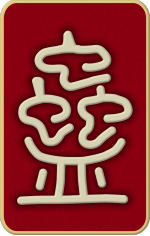
蛊 Gǔ Decay (Detoxify) [hexagram 18]


Mountain over Wind/Wood
 Earth element
Earth element
Lunar month: 3 ; Host (controlling) line : 5
The Decision
Decay can be successfully overcome with care. A great journey will be advantageous. Contemplate three days before and three days after.
Strength above, weakness below – a potentially hazardous position. ‘A great journey will be advantageous’ – moving onward will achieve results. ‘Contemplate three days before and three days after’ – an end to confusion.
蛊: 元亨, 利涉大川. 先甲三日, 后甲三日. Gǔ: yuán hēng, lì shè dà chuān. xiān jiǎ sān rì, hòu jiǎ sān rì.
彖传: 蛊, 刚上而柔下, 巽而止, 蛊. 蛊, 元亨, 而天下治也. 利涉大川, 往有事也. 先甲三日, 后甲三日, 终则有始, 天行也. Tuàn zhuàn: Gǔ, gāng shàng ér róu xià, xùn ér zhǐ, gǔ. Gǔ, yuán hēng, ér tiān xià zhì yě. Lì shè dà chuān, wǎng yǒu shì yě. Xiān jiǎ sān rì, hòu jiǎ sān rì, zhōng zé yǒu shǐ, tiān háng yě.
The Image
Mountain above wind indicates disintegration. It is wise to help others and garner virtue.
象传: 山下有风, 蛊; 君子以振民育德. Xiàng zhuàn: Shān xià yǒu fēng, gǔ; jūn zǐ yǐ zhèn mín yù dé.
Line Change 1
A child eases father’s problems, if the child is capable then the father is not to blame. Difficult – but in the end success.
‘A child eases father’s problems’ – taking on an adult’s role.
初六: 干父之蛊, 有子, 考无咎, 厉终吉. Chū liù: gàn fù zhī gǔ, yǒu zǐ, kǎo wú jiù, lì zhōng jí.
象传: 干父之蛊, 意承考也. Xiàng zhuàn: Gàn fù zhī gǔ, yì chéng kǎo yě.
Line Change 2
A child eases mother’s problems. To persevere is detrimental.
‘A child eases mother’s problems’ – finding the middle way.
九二: 干母之蛊, 不可贞. Jiǔ èr: gàn mǔ zhī gǔ, bù kě zhēn.
象传: 干母之蛊, 得中道也. Xiàng zhuàn: Gàn mǔ zhī gǔ, dé zhòng dào yě.
Line Change 3
A child eases father’s problems. Some regrets but not a big mistake.
‘A child eases father’s problems’ – eventually not regrettable.
九三: 干父之蛊, 小有悔, 无大咎. Jiǔ sān: gàn fù zhī gǔ, xiǎo yǒu huǐ, wú dà jiù.
象传: 干父之蛊, 终无咎也. Xiàng zhuàn: Gàn fù zhī gǔ, zhōng wú jiù yě.
Line Change 4
A child ignores the troubles caused by his father. If allowed to continue there will be regret.
A child ignores the troubles of his father. If allowed to continue there will be upset.
六四: 裕父之蛊, 往见吝. Liù sì: yù fù zhī gǔ, wǎng jiàn lìn.
象传: 裕父之蛊, 往未得也. Xiàng zhuàn: Yù fù zhī gǔ, wǎng wèi dé yě.
Line Change 5
A child eases father’s problems – deserving merit.
‘A child eases father’s problems – deserving merit’ – giving support is virtuous.
六五: 干父之蛊, 用誉. Liù wǔ: gàn fù zhī gǔ, yòng yù.
象传: 干父之蛊; 承以德也. Xiàng zhuàn: Gān fù zhī gǔ; chéng yǐ dé yě.
Line Change 6
Living independently. Staying aloof following own pursuits.
‘Living independently’ – a commendable aspiration.
上九: 不事王侯, 高尚其事. Shàng jiǔ: bù shì wáng hóu, gāo shàng qí shì.
象传: 不事王侯, 志可则也. Xiàng zhuàn: Bù shì wáng hóu, zhì kě zé yě.
The full set of 64 English translations is available in our new book 'Book of Changes - Deciphered' ➚.